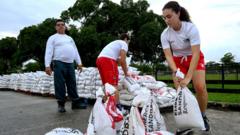Hurricane Milton, a “potentially catastrophic” category four storm, is closing in for a direct hit on Florida’s Gulf coast.
Milton has weakened slightly from a category five, but is still packing ferocious winds of up to 145mph (233km/h) after brushing past the northern edge of Mexico’s Yucatan peninsula.
The storm is expected to slam into the heavily populated city of Tampa Bay with full force on Wednesday, less than two weeks after the state was hit by Hurricane Helene.
Floridians have been told to prepare for the state’s largest evacuation effort in years.
On Tuesday, Governor Ron DeSantis said that thousands of members of Florida’s National Guard were being activated , and that additional petrol and diesel supplies were being provided to fuel stations.
The governor added that Florida had prepared dozens of shelters to help house residents left stranded in the storm.
“We have one of the sites that can do 10,000,” he said in a news briefing. “Others will do multiple thousands. But these are designed to be a shelter of last resort.”
He said on Monday that the storm looked like it was going to be a “monster”.
The White House said on Tuesday that President Joe Biden had cancelled a planned visit to Germany and Angola to oversee preparations for Milton, in addition to ongoing recovery efforts from Hurricane Helene.
Just 10 days ago Hurricane Helene – the deadliest mainland storm since Katrina in 2005 – pummelled the US south-east, killing at least 225 people. Hundreds more are missing.
At least 14 of those deaths were in Florida, where 51 of 67 counties are now under emergency warnings as Milton approaches.
While the hurricane weakened on Tuesday morning, the National Hurricane Center warned that it could double in size before striking Florida on Wednesday.
“Milton has the potential to be one of the most destructive hurricanes on record for west-central Florida,” the update said.
Early on Tuesday, winds from the hurricane weakened to 145mph, down from 180mph the night before.
Hurricanes are separated into five categories based on their wind speed.
Those reaching category three and higher are considered major hurricanes because of their potential for significant loss of life and damage, according to the National Weather Service.
The National Hurricane Center has warned that life-threatening storm surges and damaging winds along portions of Florida’s west coast were possible from late Tuesday or early Wednesday.
Rainfall totals could reach localised highs of 15in (38cm), and coastal areas could see storm surges of 10-15ft (3-4.5m).
“Use today as your day to finalise and execute the plan that is going to protect you and your family,” DeSantis told residents on Tuesday.
Counties began issuing evacuation orders on Monday, and tolls will be suspended on roads in western and central Florida.
Long queues at petrol stations began forming in south Florida, with some reports of stations running out of fuel.
Traffic congestion in some areas has increased by as much as 90% above average, DeSantis said.
School closures in several counties begin on Tuesday.
Keith Turi, a spokesperson for the Federal Emergency Management Agency (Fema), said: “I’m encouraged by the amount of evacuation that’s going on right now.
“This is actually a good sign.”
Parts of Pinellas County, where at least a dozen people were killed by Helene, were placed under evacuation orders on Monday.
Airports in Tampa and Orlando announced they would be suspending flight operations from Tuesday because of the storm.
A town hall style event to be filmed with Republican presidential nominee Donald Trump in Miami on Tuesday was postponed until next week.
“The health and safety of everyone involved in this event is the highest priority,” said the host network Univision.
The approach of the new hurricane comes as the US government warns that clean-up efforts could take years after Hurricane Helene.
Over 12,000 cubic yards of debris have been removed in Helene-affected areas of Florida in less than two days, officials said.
Hundreds of roads in affected areas remain closed, hampering efforts to send aid to hard-hit communities.
Helene made landfall in late September as a category four hurricane.
As well as in Florida, deaths were recorded in Georgia, South Carolina, Tennessee and Virginia – and the worst-hit state, North Carolina.
Biden has ordered another 500 soldiers to be deployed to North Carolina. The troops – who now number 1,500 in all – will work with thousands of government relief workers and National Guard.
Biden has so far approved nearly $140m (£107m) in federal assistance.
Sign up for our Future Earth newsletter to get exclusive insight on the latest climate and environment news from the BBC’s Climate Editor Justin Rowlatt, delivered to your inbox every week. Outside the UK? Sign up to our international newsletter here.






